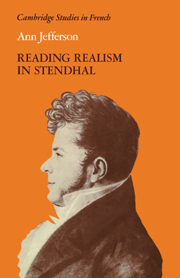Book contents
- Frontmatter
- Contents
- Preface
- PART ONE Introduction
- PART TWO De l'Amour
- PART THREE Le Rouge et le Noir
- 3 Unexpressing the expressible
- 4 The speaking of the quoted word: authors, ironies and epigraphs
- 5 The uses of reading
- PART FOUR Vie de Henry Brulard
- PART FIVE La Chartreuse de Parme
- Conclusion
- Notes
- Bibliography
- Index
- Cambridge Studies in French
3 - Unexpressing the expressible
Published online by Cambridge University Press: 05 February 2012
- Frontmatter
- Contents
- Preface
- PART ONE Introduction
- PART TWO De l'Amour
- PART THREE Le Rouge et le Noir
- 3 Unexpressing the expressible
- 4 The speaking of the quoted word: authors, ironies and epigraphs
- 5 The uses of reading
- PART FOUR Vie de Henry Brulard
- PART FIVE La Chartreuse de Parme
- Conclusion
- Notes
- Bibliography
- Index
- Cambridge Studies in French
Summary
détacher une parole seconde de l'engluement des paroles premières
Barthes, Essais critiquesTrials and the lover's tribute: ‘L'affaire Berthet’
In his projected article on Le Rouge Stendhal prides himself on being the first to describe a wholly new phenomenon, ‘l'amour parisien’, and on thus overcoming the major difficulty in writing fiction, ‘ne pas copier des livres’ (‘Projet’, p. 716, Stendhal's italics). He states quite categorically that, ‘Cette peinture de l'amour parisien est absolument neuve. Il nous semble qu'on ne la trouve dans aucun livre’ (p. 724). But if Stendhal manages to write without other books, he does so in order to represent a subject that is almost entirely dependent on books – love in general and ‘l'amour parisien’ in particular. Furthermore, books contaminate not just the subject of the novel, but its very origins; for in composing Le Rouge Stendhal relied to a great extent on sources of the most vulgar and platitudinous kind, namely the newspaper reports of two murder trials as contained in the Gazette des Tribunaux. The first of these, known as l'affaire Berthet, appeared between 28 and 31 December 1827; and the second, l'affaire Lafargue, was reported in two versions, one in the Gazette, and the other in the Courrier des Tribunaux, between 30 March and 1 April 1829, only a few months before Stendhal began working on Le Rouge. His interest in this latter case is also revealed by the fact that he copied out large sections of the reports almost verbatim in his Promenades dans Rome, which was published in the same year.
- Type
- Chapter
- Information
- Reading Realism in Stendhal , pp. 67 - 92Publisher: Cambridge University PressPrint publication year: 1988



